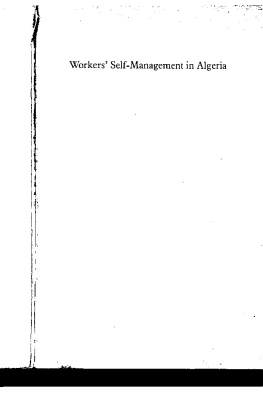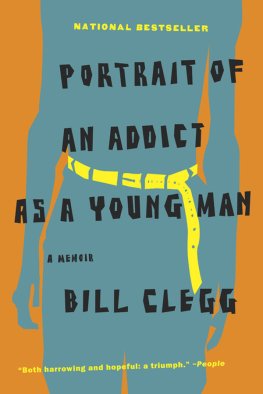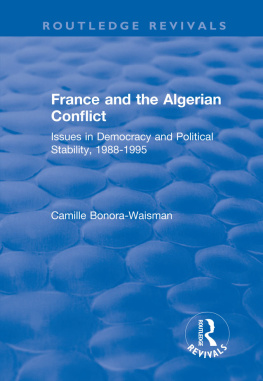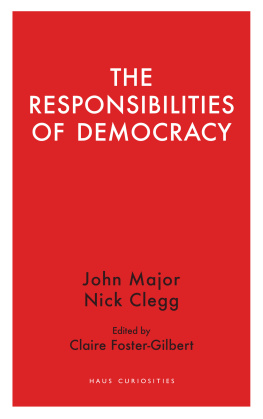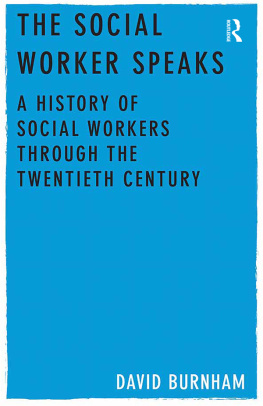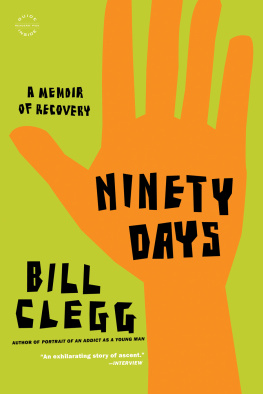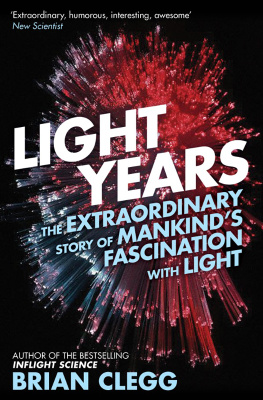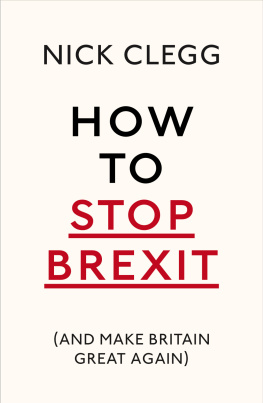WORKERS SELF-MANAGEMENT IN ALGERIA
Ian Clegg
NEW YORK AND LONDON
Copyright 1971 by Ian Clegg All Rights Reserved
Library of Congress Catalog Card Number: 73-178709 First Printing Monthly Review Press
116 West 14th Street, New York, N.Y. 10011 33/37 Moreland Street, London, E.C. 1
Manufactured in the United States of America
CONTENTS
GLOSSARY
In order to help the reader, who may become confused by the proliferation of abbreviations, a short glossary is included. It is divided into two sections: the first dealing with political and military bodies, the second with post-independence economic bodies.
ALN ANP CCE CNRA CRUA FFS FLN GPRA MTLD OAS OS PCA PPA PRS UDMA UGTA | Arme de Libration Nationale Arme Nationale et Populaire (ex ALN) Comit de Coordination et dExcution (of the FLN) Conseil National de la Rvolution Algrienne Comit Rvolutionnaire pour V Unit et VAction Front des Forces Socialistes Front de Libration Nationale Gouvernement Provisoire de la Rpublique Algrienne Mouvement pour le Triomphe des Liberts Dmocratiques Organisation de TArme Secrte Organisation Spciale Parti Communiste Algrien Parti du Peuple Algrien Parti de la Rvolution Socialiste Union Dmocratique du Manifeste Algrien Union Gnrale des Travailleurs Algriens * |
BCA BNA BNASS CCAA CCRA CORA CRC ONACO ONP ONRA ONT SAP | Banque Centrale dAlgrie Banque Nationale dAlgrie Bureau National dAnimation du Secteur Socialiste Conseil Communal dAnimation dAutogestion Centres Coopratifs de la Rforme Agraire Coopratives de la Rforme Agraire Caisses Rgionales de Crdit Office National de Commercialisation Office National de la Pche Office National de la Rforme Agraire Office National des Transports Socits Agricoles de Prvoyance |
*
Translations in this book, unless otherwise indicated, are those of the author. In the transliteration of Arabic or Kabylie names, the French system has been used.
WORKERS COUNCILS:
A HISTORICAL PERSPECTIVE
The slow demise of classical colonialism in the 1950s and early 60s witnessed the largely peaceful surrender of the institutions of political power by metropolitan governments to indigenous political lites. In only two areas was there a protracted and violent struggle for liberation from the colonial emprise. For over ten years France was involved, first in Indochina and then in Algeria, in attempting to crush movements for national independence by the large-scale use of armed force. The passions inspired inside France by this struggle caused the end of the Fourth Republic and emphasized political divisions with a violence that is still clearly manifested. For many of the French, Vietnam and Algeria came to symbolize the extension and the actuality of the conflict between colonialism and national liberation, capitalism and socialism. Ho Chi Minh and Ben Bella joined Mao and Castro as the personifications of this revolt and became heroes of the left. The modes of economic and social organization of these revolutions became a source of identification between the socialist theory of the industrialized West and the chance of practice in the Third World.
This book is not a history of the Algerian revolution. It is concerned with a specific product of that revolution: the workers committees set up to manage the agricultural estates and factories of the colonial bourgeoisie in the summer of independence, 1962. These committees were formalized as a system of economic management known as autogestion (self-management). Autogestion , with its emphasis on decentralization and democracy, its opposition to the rigid forms of bureaucratic socialism, came to be regarded as the real revolutionary achievement of independence. For many socialists autogestion came to symbolize not only an escape from the authoritarian Russian model but a clear example of the possibilities of developing a libertarian and revolutionary socialism in the Third
World. Yet within five years the hero, Ben Bella, had been removed from power and autogestion in practice all but replaced by centralized state control.
The following description of autogestion in Algeria must not be regarded as the analysis of an isolated experience. Outside its own specific history Algerian self-management must be clearly situated within the wider history of attempts to create socialist modes of economic, social and political organization. It is part of the experience of the international revolutionary movement. In particular it is relevant to the whole problem of the forms of socialism in the Third World and the transplanting of a theory and practice developed mainly in the West. The development of a socialist ideology centred round self-management is mainly the work of the more libertarian sections of the Western left. These ideas have developed within the context of advanced industrial society. The question is whether, in terms of the present problems of the excolonial countries, the solutions implied by self-management are immediately relevant. Algerian autogestion thus assumes the proportions of an experiment in modes of revolutionary organization.
The comits de gestin (workers management committees) set up in Algeria in 1962 were not, as will be made clear later, the practice of a conscious socialist theory. The elaboration of a theory to correspond with that practice emerged during 1963 and 1964, culminating in the Charte dAlger - the official political programme of the Algerian revolution. The architects of this programme were clearly influenced by the experience of West and East European socialism, as well as China, Vietnam and Cuba. It is with this history that they sought identification.
Two distinct theoretical traditions, which often blend in practice, can be seen behind the formation of workers councils in a revolutionary situation. Both are concerned not only with the destruction of capitalism and the disposition of power in the revolution but also with the question of work as a mediating factor in mans relation to his environment. These can be termed anarcho-syndicalism and the more orthodox Marxism-socialism.
The early nineteenth century saw the emergence of utopian socialist ideas that the worker should exert some form of control over the process of production. These ideas are clearly seen in Le Nouveau Monde Industriel et Socitaire and La Fausse Industrie by
Charles Fourier and the practical experiments of Robert Owen. Common to most of the utopian socialists was the feeling that work communities were an answer to the increasing degradation of man in the conditions of the industrial revolution. Their generalized ideal was a return to the small artisan communities existing before the industrial revolution; even though this golden age existed mostly in their own romantic vision of the past.1 Beneath this rather effulgent romanticism lay the firm conviction that work could be made meaningful; that it was large-scale industry as well as capitalism that made it slavery. This basic hostility to industrialization and the emphasis on decentralized, small-scale economic and political units became the common factor for a whole current of utopian anarchist thought. It was expressed in America by Thoreau and Thorsten Veblen and in England by Ruskin and William Morris. Morriss News from Nowhere is probably the clearest expression of the form of such a utopian society. Kropotkin was perhaps the only one to place this utopianism within a strictly anarchist perspective in Fields , Factories and Workshops and Mutual Aid: A Factor in Evolution.
Next page
